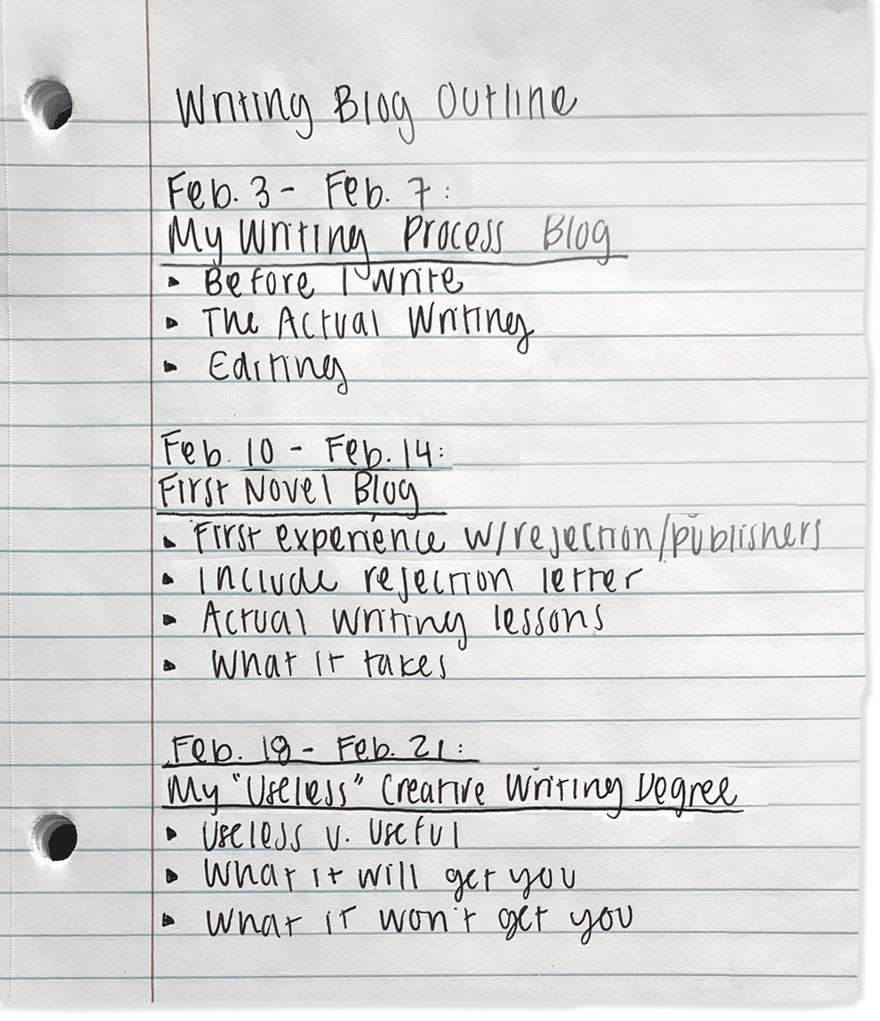

Maddie Gray
Content Lead
Tips for Writing Every Day… from Someone Who Hasn’t Figured It Out
Let me kick this off by saying: I don’t write every day.
Every year for at least the last three years (and probably longer) my New Year’s resolution has been to write every day, and this year is no different. One of these years, I’ll figure out just the right combination of stressors to follow through all year long. Then one year will turn into two, two into three, and on and on until I’ve collected my 10,000 hours and Malcom Gladwell classifies me as a writing master. Marketers, here are a few ideas for putting a writing structure together that feels very doable, and might even get you excited about creating consistent and meaningful content.
Why Write Every Day?
The truth is, writing every single day probably isn’t really necessary. That being said, there are only two ways to get better at writing: writing and reading. As a copywriter and aspiring author, improving my writing skill is important to me. When I set the goal of writing every day, at the very least I will write some. I’ll improve my writing. I’ll get better at my chosen craft.
For me, setting goals like this one helps me measure my progress in life. I won’t notice that I’m moving forward if I don’t have a to-do list filled with checked boxes. I know that for many people, goal-setting and resolutions aren’t necessary. They can feel the wind in their hair as they move through life, and they’re satisfied moving in whatever direction it blows them—they can feel themselves making progress without setting explicit benchmarks. That’s great! I wish I were a little more like you guys—but the rest of this post probably isn’t for you.
To my fellow goal-oriented folks—read on!
The new year has just begun, so it’s time to start brainstorming new strategies to keep the words flowing in 2020. If you guys are looking for ideas to keep yourselves writing new content, stories, poems, or the next big novel in 2020, here are some strategies to (hopefully) help you (and me) get there.
Outline
My biggest project right now is a novel that I’m trying to finish. I’m about half-way through my second draft, so I outline in a couple of different ways. First, I assign each chapter a different time frame. December 15-28, I will finish Chapter 10. Then, I make sure I know exactly what needs to go into each chapter: Character A needs to do X. Z needs to happen, and so on. This ensures that when I sit down to write, I can get right to it. So long writer’s block!
If you’re looking to create content for a marketing message, floor event flyer, or landing page, outlining is going to look a little different. Whether you commit to daily comments on social media posts, daily reviews in a social interest group, or just a tweet asking for your followers’ feedback. You can still plan out a time frame, but this time assign a different topic or blog idea to each date range. January 13-17, I will write the “My Writing Process” blog post.

Then outline what exactly you want to cover in that blog post. I don’t go quite as in-depth with blog posts as I do novel chapters—usually I’ll plan out my title and plot out my main points (often in the form of sub-heads) before I start writing. The hardest part of the task is coming up with a bunch of topics you feel excited about writing. So start today by eeking out 10 topics for your marketing campaign, landing page teaser, or social marketing strategy. You get the idea. Outline your timeline then outline your ideas. Don’t give the juices time to stop flowing.
Hold Yourself Accountable
I think this one is where I’ve fallen flat in the past. Last year, I tried calendaring my process. On the days I wrote, I sharpied a check-mark on the calendar. When I didn’t write, I drew an “X” instead. That worked fairly well for the first month or two, but then I stopped keeping track. I’d try to fill in the successes and failures two weeks later, and I ended up fudging the numbers more than I’d like.
Here’s my new (and not so revolutionary) idea that I’m considering for this year. Social media. The thought is that maybe if I can trick myself into thinking that other people depend on me writing every day, I’ll do it. For those of you looking to create more content for the purpose of increasing your social media or website presence, this is an easy box to check.
I think the trick with this one is balance. You have to find a way to motivate yourself to write, not to distract from it. If you get too hung up on checking each post for likes and comments, this might not be the way to go.
Here’s a good example: a little while ago I thought it might be a good idea to start a personal blog all about writing. I came up with a title, and I got all excited to share my writing journey with the world—and then I thought about it a little harder. Would adding an entirely new writing project to my plate really help me to finish my other projects? Probably not. It’s all about balance and what works best for you.
Maybe the best strategy is having a friend or loved one text you once a day to see if you’ve written yet. Maybe you just need to set an alarm on your phone, add a mark to your calendar, or cross an item off of your to-do list. Do whatever works for you (and experiment until you find out what that is.)
Picture Your Desired Outcome
This one is for those days when you have no motivation to write. It’s the last thing you want to do, you would rather go scrub the floor in the bathroom than so much as look at a keyboard. We all have those days.
The only thing that helps me get past those inevitable humps is a little bit of imagination. Think back to the reason you want to write every day in the first place. For me it boils down to this: I want to be a published author. I want the working from home in my pajamas, I want the book tours, I want the supplemental income.
When I’m feeling less than enthused about writing, I imagine what my life will be like after I am a published author. After I have all of those things I’ve been dreaming about. It usually does the trick.
Other things that work for me: force yourself to think about whatever you’re writing. You don’t have to go sit at your desk and start writing. Just make yourself think about it for a while. More often than not, I stumble across a solution to a problem or a cool sentence that I need to write down right away, before I forget. Guess what? You just wrote something. It counts!
Don’t be Too Hard on Yourself
Here’s the last and most important piece of advice I can offer you. Don’t take it too hard if you miss a day here or there. Don’t take it too hard if you totally blow it and don’t write for a month. If you are too hard on yourself, it will be almost impossible to get back in the writing groove. I already broke my streak. What difference does it make if I don’t write today? I’ve fallen into this trap many times. Try to remember this: the goal is not to be perfect. The goal is to write more.
So, what are you waiting for? Let’s write more this year than last year. Create more content. Make more progress. Improve ourselves. Cheers to 2020—may it bring you writing success.
Jason’s Take
I think Maddie helped me crack the code. I discovered that my quick outlines for my blog posts doubled nicely as social posts, or contributions to conversation strings. Moreover, outlining helped me feel much less overwhelmed about writing. I love a blank canvas…that is, when I’m holding a sketching pencil, not a writer’s pen. I’m working on feeling more confident about creating words, like I currently am with doodles, diagrams and rough sketches. It will take some time, but a lot less time if I can commit to a little bit every day. This article has helpe me do that. Watch out, 2020!
